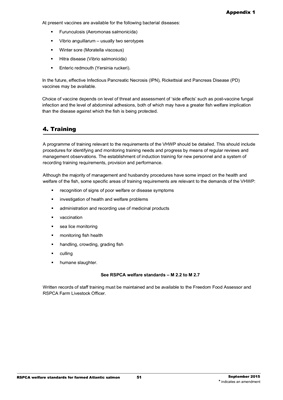
Appendix 1
RSPCA welfare standards for farmed Atlantic salmon 51 September 2015
* indicates an amendment
At present vaccines are available for the following bacterial diseases:
Furunculosis (Aeromonas salmonicida)
Vibrio anguillarum - usually two serotypes
Winter sore (Moratella viscosus)
Hitra disease (Vibrio salmonicida)
Enteric redmouth (Yersinia ruckeri).
In the future, effective Infectious Pancreatic Necrosis (IPN), Rickettsial and Pancreas Disease (PD)
vaccines may be available.
Choice of vaccine depends on level of threat and assessment of 'side effects' such as post-vaccine fungal
infection and the level of abdominal adhesions, both of which may have a greater fish welfare implication
than the disease against which the fish is being protected.
4. Training
A programme of training relevant to the requirements of the VHWP should be detailed. This should include
procedures for identifying and monitoring training needs and progress by means of regular reviews and
management observations. The establishment of induction training for new personnel and a system of
recording training requirements, provision and performance.
Although the majority of management and husbandry procedures have some impact on the health and
welfare of the fish, some specific areas of training requirements are relevant to the demands of the VHWP:
recognition of signs of poor welfare or disease symptoms
investigation of health and welfare problems
administration and recording use of medicinal products
vaccination
sea lice monitoring
monitoring fish health
handling, crowding, grading fish
culling
humane slaughter.
See RSPCA welfare standards - M 2.2 to M 2.7
Written records of staff training must be maintained and be available to the Freedom Food Assessor and
RSPCA Farm Livestock Officer.